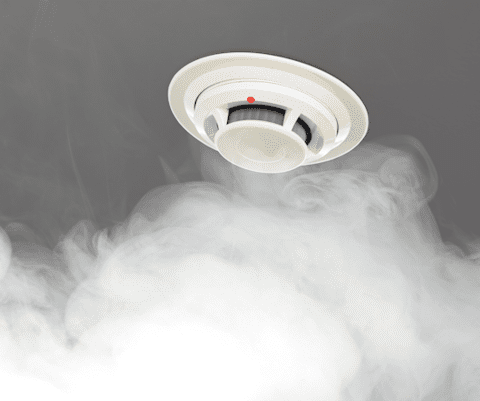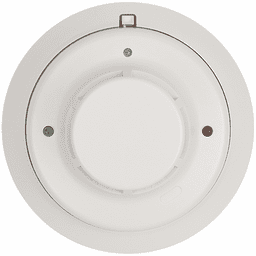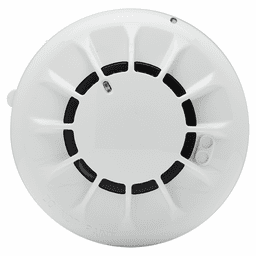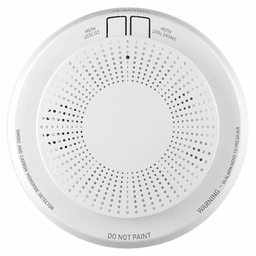Smoke Detectors - GeoArm Security®
Smoke Detection
Early Fire Warning!
A smoke detector is a device that senses smoke particles in the air and initiates an alarm to alert people in a building or home about the potential fire hazard. Smoke detectors are designed to detect the presence of smoke and warn occupants to evacuate the building before the fire spreads out of control. These devices can be standalone units or integrated into a larger fire alarm system. They are usually powered by battery or a building's electrical system, and can be placed in various locations throughout the building, including bedrooms, living areas, and hallways. Smoke detectors are essential for early fire detection and can save lives by providing early warning of a fire.
According to statistics, having a working smoke detector reduces your chances of dying in a house fire by 50%. We provide 24/7 monitoring of smoke detectors for both residential homes and commercial buildings. When a smoke alarm is triggered, a signal is sent to the GeoArm central monitoring station where operators then immediately contact the local fire department or other emergency services. Having monitored smoke detectors, ensures that help is dispatched as quickly as possible to the location of the alarm, which can reduce damage caused by a fire and potentially save lives. Smoke detector professional monitoring services are an important component of any fire protection and security plan.
The main difference between a wired smoke detectors and a wireless smoke detectors is how they are installed and operate. A wired smoke detector is connected to the building's electrical system and may also have a backup battery. This type of smoke detector typically requires professional installation and is hardwired into the building's electrical system. On the other hand, a wireless smoke detector operates using wireless technology to communicate with the rest of the alarm system. It communicates wirelessly with a control panel and if monitored to the GeoArm central station too. Overall, wired smoke detectors are more reliable since their connection to the electrical system is not vulnerable to wireless interference or a battery failure, but they are less flexible in terms of placement and ease of installation. Wireless smoke detectors are easier to install in any location and can be integrated into a variety of security systems, but they are dependent on a power source and their reliability can be affected by the strength of the signal. The choice between the two types of smoke detectors depends on the specific needs of the property and the security system.
Smoke detectors are often required by insurance companies to qualify for savings on homeowners' insurance premiums. The installation and maintenance of smoke detectors can reduce the risk of fire damage in a home, which is a concern for insurance companies. It's important to check with your insurance provider to see what requirements they have regarding smoke detectors and any potential savings on your insurance policy.

Common Uses for Smoke Detectors?
1. Residential Safety - In homes, smoke detectors are crucial for alerting occupants to the presence of smoke, allowing them to evacuate quickly and safely.
2. Commercial Buildings - In offices, malls, and other commercial spaces, smoke detectors are part of comprehensive fire alarm systems that help protect both people and property.
3. Industrial Facilities - In industrial settings, smoke detectors are used to monitor for fires that could result from machinery malfunctions or chemical reactions.
4. Public Buildings - Schools, hospitals, and government buildings use smoke detectors to ensure the safety of large numbers of people.
5. Integrated Systems - When integrated into broader security systems, smoke detectors can trigger other safety measures, such as unlocking doors, activating sprinkler systems, or notifying GeoArm emergency services.
6. Specialized Environments - In environments like data centers or museums, where smoke can cause significant damage, specialized smoke detectors are used to provide early warning and protect sensitive equipment or artifacts.
Installation Tips for Smoke Detectors?
1. Placement - Install smoke detectors on every level of your home, including the basement. Place them inside each bedroom and outside sleeping areas. In larger homes, additional detectors may be necessary.
2. Ceiling Mounting - Smoke rises, so it's best to mount detectors on the ceiling. If you must mount them on a wall, place them no more than 12 inches from the ceiling.
3. Avoiding Dead Air Spaces - Do not install smoke detectors near windows, doors, or ducts where drafts might interfere with their operation. Also, avoid corners where air might not circulate well.
4. Distance from Cooking Appliances - To reduce false alarms, keep smoke detectors at least 10 feet away from cooking appliances.
5. Regular Testing - Test your smoke detectors monthly to ensure they are working properly. Most detectors have a test button for this purpose.
6. Battery Replacement - Replace the batteries at least once a year, or whenever the detector chirps to indicate low battery. Consider using long-life batteries for less frequent changes.
7. Interconnected Detectors - If possible, use interconnected smoke detectors. When one detects smoke, they all sound the alarm, providing an earlier warning.
8. Professional Installation - For hardwired systems, consider hiring a professional to ensure proper installation and compliance with local building codes.
9. Maintenance - Clean your smoke detectors regularly by vacuuming them to remove dust and debris that could interfere with their operation.

Companies
 Month-to-Month Subscription Plans
Month-to-Month Subscription Plans Takeover a Wide Range of Control Panels
Takeover a Wide Range of Control Panels Choose from Non-Proprietary Equipment
Choose from Non-Proprietary Equipment Optional 24/7 Professional Central Station
Optional 24/7 Professional Central Station More Flexible DIY Brands and Services
More Flexible DIY Brands and Services Nationwide Coverage is Supported
Nationwide Coverage is Supported Inexpensive Remote Technicians
Inexpensive Remote Technicians


































